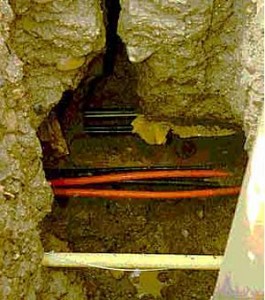Kangaroo Kronicles 18 – Don’t Be Silly, Do the Due Dilly
Saturday, July 23, 2011 By Stu Silver ·0
Kangaroo Kronicles 18 – Don’t be Silly, Do the Due Dilly
By
Stu Silver / “Uncle Zally”
____________________________________________________
 When you own a Mobile Home Park, you are the mayor of your own small town.
When you own a Mobile Home Park, you are the mayor of your own small town.
The good news is, you don’t have to run for election, and you control your pay. However, the office of mayor comes with responsibilities.
More good news. You can choose whether you want the responsibility, or not, given the pay.
Your responsibility involves making sure of three things:
1- The park can pay its bills (your pay is one of them)
2- You can manage the people in the park under the existing laws
3- You can maintain the infrastructure (utilities, roads, common areas)
The good news is, you are not doing all of the above by yourself. You have lots of help, i.e. people to delegate work to. You have a park manager, maintenance people, and subcontractors. Your job is to oversee them, make sure they do a good job, and then pay them, like a mayor.
Due diligence, or “due dilly” as I call it, is the information you uncover about your three areas of responsibility in the park. If you feel comfortable after you uncover the information, you buy the park, and become the mayor / owner. Please don’t feel that due diligence is a “do or die” kind of endeavor. If you uncover something that makes you uncomfortable, many times you can re-negotiate the terms of your purchase so you are, or move on to purchase another investment.
 I designed a simplified plan for doing due diligence, called “The Due Dilly 4 Step.” (If you ask me nicely, I will send it to you.) You must perform the Due Dilly 4 Step with a skeptical attitude. There is a lot of money at stake when you buy a mobile home park, and whenever there is a lot of money at stake, sellers have a tendency to flush their honesty down the toilet, and hope it doesn’t back up.
I designed a simplified plan for doing due diligence, called “The Due Dilly 4 Step.” (If you ask me nicely, I will send it to you.) You must perform the Due Dilly 4 Step with a skeptical attitude. There is a lot of money at stake when you buy a mobile home park, and whenever there is a lot of money at stake, sellers have a tendency to flush their honesty down the toilet, and hope it doesn’t back up.
Let’s examine the areas of due dilly, from the simplest to most difficult.
Can the park pay its bills (your pay is one of them)
Perhaps you have heard the expression: The most important thing to do when you invest in real estate is to work the numbers, and if the numbers work, you buy the property.
If you believe that, raise your hands, or nod your heads.
 Okay, now put down your hands, and stop nodding like bobble heads. The fact that the property throws off a profit, so you can get paid a profit, is only the first step, not the ONLY step.
Okay, now put down your hands, and stop nodding like bobble heads. The fact that the property throws off a profit, so you can get paid a profit, is only the first step, not the ONLY step.
Yes, the park has to make a profit, or you will be working for free, or worse, you will be paying to be the mayor. Only Mayor Michael Bloomberg of New York City has enough money to do that, because he entered the job as a billionaire … the rest of us mortals and want to get paid a return for our time and capital.
Now take this to heart this about the numbers an owner, or real estate broker, will supply you about a park they are selling – there will be a strong temptation to overstate the income, and understate the expenses, which will overstate the NOI, the net operating income, which will then overstate the value/ price of the park. You must check everything.
What if the park doesn’t make enough of a profit?
Then you must ask yourself, can you reliably execute a strategy where it will be profitable? If so, how much time, and additional capital, will it take to make it profitable?
Okay, you have determined the park / town makes money and can pay you a handsome salary. Now comes question 2:
Do you want to manage the people under the existing laws?
The park may be filled with warm, generous, nice people, that you like and admire … OR … the park could be a drug infested, crime ridden, hell hole that you want no part of … OR … it may be something in between.
It usually is something in between.
 This is just as important as the profit. If the town has mostly wonderful people, and a few hellions, then you might want to become mayor, and then remove the hellions. Will the laws of the area allow you to do that, quickly, easily, and cheaply? If so, you proceed to the third area of responsibility.
This is just as important as the profit. If the town has mostly wonderful people, and a few hellions, then you might want to become mayor, and then remove the hellions. Will the laws of the area allow you to do that, quickly, easily, and cheaply? If so, you proceed to the third area of responsibility.
Can I maintain the infrastructure (utilities, roads, common areas)?
Infrastructure can be something that you can take for granted, because it will function well for the next 100 years, and will be maintained by governmental agencies, where they have total responsibility, OR …
Infrastructure may be solely your responsibility, and if God forbid, it breaks down, it can break your bank account, and affect your profitability for the foreseeable future.
 The difficulty with infrastructure is that most of it is underground, where you can’t see it. That’s okay. There are civil engineers and contractors that you can hire to determine any current or future problems with water, sewer, gas, and electric lines that you can’t see, as well as roads and common areas that you can.
The difficulty with infrastructure is that most of it is underground, where you can’t see it. That’s okay. There are civil engineers and contractors that you can hire to determine any current or future problems with water, sewer, gas, and electric lines that you can’t see, as well as roads and common areas that you can.
How long does it take to conduct due dilly? It depends on the size of the park, the construction of the park, and your experience in running a park and conducting due diligence. Using the most simplifying assumptions, you can figure the following time periods for due dilly:
1- 25 units or less – 3 weeks to a month
2- 50-75 units – 30 to 45 days
3- 100 units or more – 60 days
 Keep in mind, not all this time is spent on site, at the park and at the government agencies that supervise the area. When you read the “Due Dilly 4 Step” you will discover there are two types of due dilly you do. There is “sitting down” due dilly, which you can do from anywhere in the world there is a desk, a phone, and computer. Then there is “on your feet” due dilly, which you must execute on site at the park.
Keep in mind, not all this time is spent on site, at the park and at the government agencies that supervise the area. When you read the “Due Dilly 4 Step” you will discover there are two types of due dilly you do. There is “sitting down” due dilly, which you can do from anywhere in the world there is a desk, a phone, and computer. Then there is “on your feet” due dilly, which you must execute on site at the park.
If you are well-organized, you can spend as little as three days with “on your feet” due dilly. Allowing a week on site would be a safer assumption.
Since the thrust of last week’s blog, this blog, and the next two, will be investing a long distance from your home, the question should he asked:
How difficult is it to do due diligence from a long distance away?
Not very, if you can allow yourself up to a week on site, and the time to do the “sitting down” due dilly elsewhere.
Do you have to do the due dilly yourself? No, but there are three benefits if you do.
One, you will be learning things you can get in any books or training. Facts on the ground are the most valuable, don’t you think?
Second, you will be forming a relationship with the seller, and the manager, which will help you in the future. If you have problems with obtaining outside financing, a strong relationship with the seller may allow you to segue into owner financing.
 Third, you may learn ideas on how to maximize profits on a mobile home park that you can use elsewhere in the future.
Third, you may learn ideas on how to maximize profits on a mobile home park that you can use elsewhere in the future.
What if you don’t have the time, the desire, or the inclination to do the due dilly? Can you hire it out? Yes, but it will cost money. How much money will depend on how big the park is. You should insist on lots of pictures and video, and someone with an impeccable reputation.
Interviewing the manager will be an important part of your due dilly, and the key to making sure your park is as profitable as possible, managed as smoothly as possible, and the infrastructure functions as well as possible for the residents.
I will discuss what to look for in a manager, and how to find a good one when you need one, in the next blog. Until then …
Cheers, mate!
Filed under Articles · Tagged



